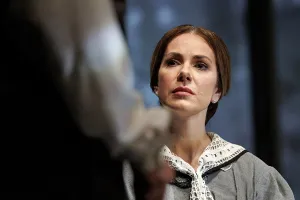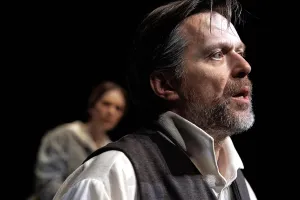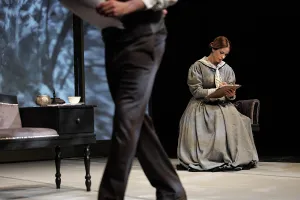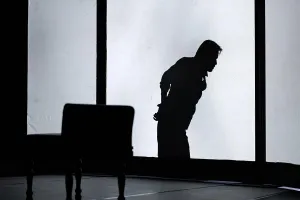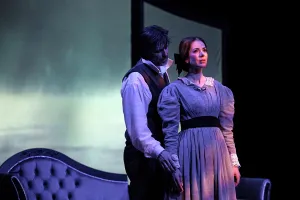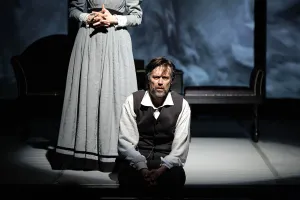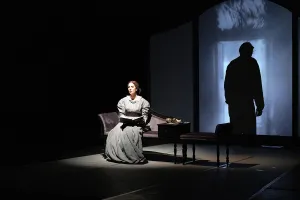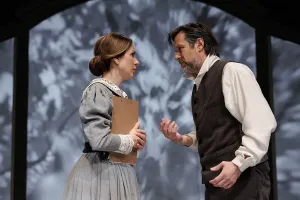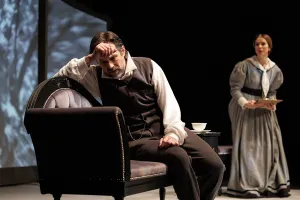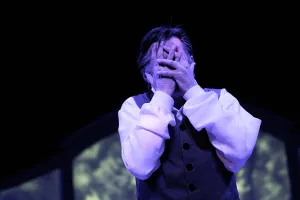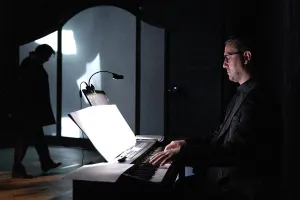Dostoevsky - My Life
duodrama based on the motifs of the memoir "Memories" by A. G. Dostoevsky
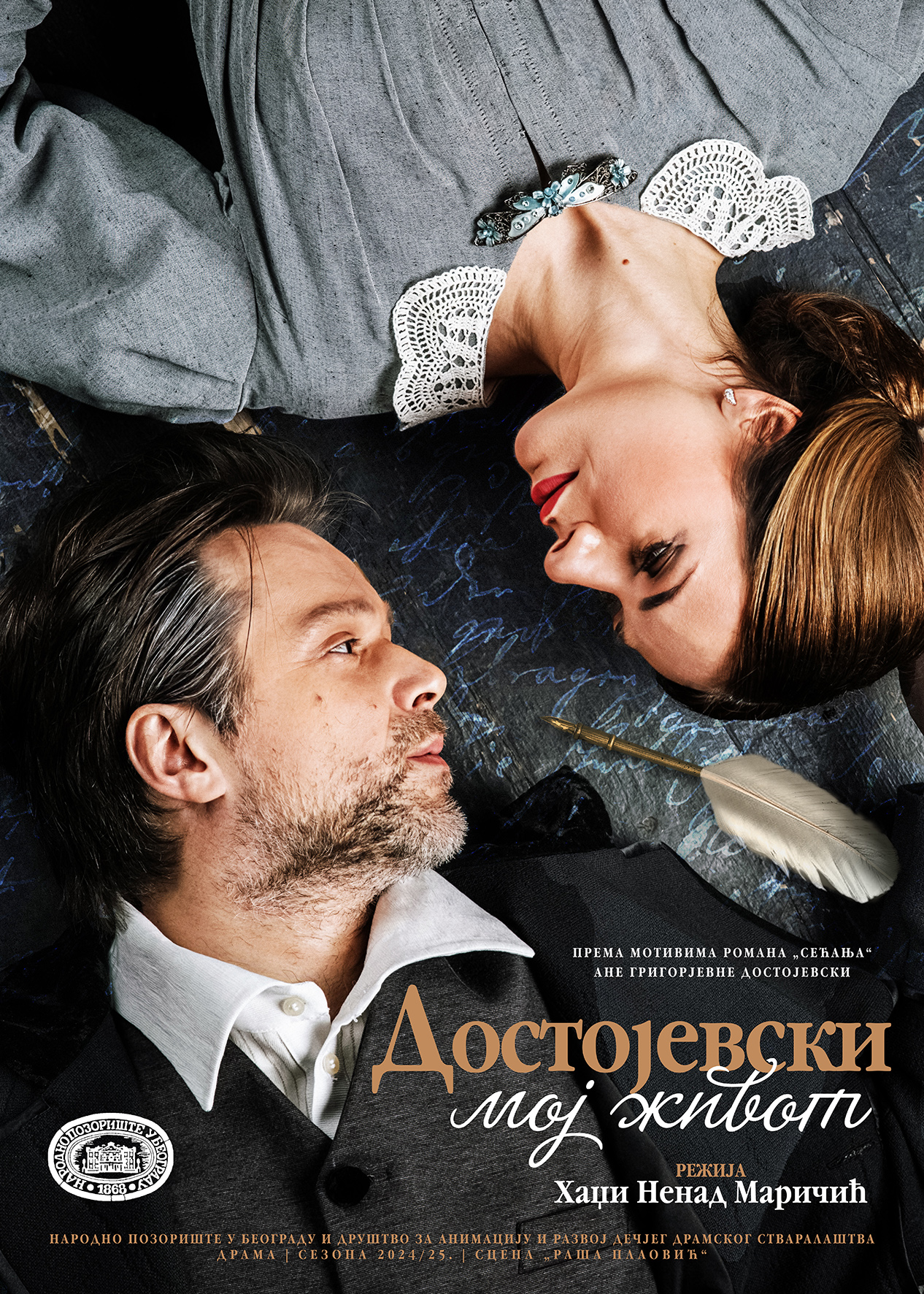
A WORD FROM THE DIRECTOR
It took a long time to come up with this title. Many unusual circumstances accompanied the birth of a play about Dostoevsky. Exactly twenty years ago, Fedor and I were discussing such a play, with which I could graduate. Professor Predrag Bajčetić often reminded me not to forget that idea. For a long time, I couldn’t find the right form to express everything I discussed in my lectures about the complex personality of the great author. It was only when I realised that solely through the character of Anna Grigoryevna could Fyodor Mikhailovich be fully portrayed, in theatrical language, that everything began to come together. It had to be done like this because the play itself reveals how much the devotion of one woman, her sacrifice and self-denial in love, contributed to the indescribable enrichment of world literature. If Fyodor and Anna had not met, it would have been hard for the author of “Crime and Punishment” to reach those moments in his creative work in which “Demons” or “The Brothers Karamazov” were created.
The story written by Anna Grigoryevna Snitkina is very moving and inspiring. No one remains indifferent when reading her memoirs, so it is logical that all Russian TV series or films about Dostoevsky’s biography have been considerably inspired by her memories. It is hard to find his biography that, from his forty-sixth year onward, does not rely on her reminiscences. Her spirit is remarkably, and yet very subtly, brought to life on stage by Ivana Popović. The audience will clearly understand, through her performance, how much this gentle yet strong woman was truly a part of Fyodor’s novels and sentences.
When I proposed this play to the National Theatre, I wrote that, alongside all the scientific achievements, it was only the art of theatre that can embody the character of such a writer whose birth we either celebrated or forgot across the world four years ago. It was precisely because of this that the task was so challenging - to bring such an idea to life, to resurrect him, and to make him somewhat different from what prejudices and legends have created. Undoubtedly, due to the circumstances in which he lived, and that extraordinary experience on Semyonov Square when he narrowly escaped execution, he spent his entire life in fear of the unpredictable. This intensified his illness, epilepsy, but also his synthesis, his reflections, and thus Russia, and later the world, gained a visionary, Christian apostle who feared suffering in the century to come. Unfortunately, his fears came true. The 20th century was mankind’s greatest fall in the long history of civilisation.
What makes him so appealing to today’s readers around the world, especially those who, in their student years, seek answers to the greatest questions about the human soul, is his “path to salvation”. He gives all of his characters a choice on which path to continue their journey - on the path of good or evil, of sin or truth - and that is precisely how he brings us closer to salvation. He reveals to us the secrets by which we can be freed from the hell of our own delusions.
It is remarkable how young people transform in their second year at the Drama Academy while playing his characters. And they all return to him later in life. That’s why all my students, both former and current, are eagerly and impatiently awaiting the play about this peculiar man who intrigues us because he has transformed us all.
I am certain that, even today, he would call on the world to return to the truth. He might even hide so that they would not recognise him, afraid of the crucifixion. This world we live in, he foresaw and understood with horror, knowing that the meek and gentle would be considered idiots in our society. However, the hint that such people will rise up and set out on a journey to accomplish noble deed kindles hope that our world will not collapse under the weight of conformism, the religion of the new era, but will return to its essence, and through love, save “its nature.” Only through love.
EXCERPT FROM “MEMOIRS” OF ANNA GRIGORYEVNA DOSTOEVSKAYA
One of our evenings, always peaceful and joyful, quite unexpectedly for us ended very turbulently. This happened at the end of November. Fyodor Mikhailovich, as usual, arrived at seven o’clock, this time quite chilled. He drank a cup of hot tea and asked if we perhaps had any cognac. I answered that we didn’t have cognac, but that we had good sherry, and immediately brought it to him. Fyodor Mikhailovich drank three or four large glasses all at once, then more tea, and it was only then that he warmed up. I was surprised that he was so chilled and didn’t know why. The answer came quickly. While I was walking through the hallway to get something, I noticed Fyodor Mikhailovich’s autumn padded coat on the coat rack instead of his fur coat. I went straight back to the guest room and asked:
- Didn’t you come today in a fur coat?
- No - Fyodor Mikhailovich was confused – I wore my autumn coat.
- How can you be so careless! Why aren’t you wearing your fur coat?
- They said it would be warmer today.
- Now I understand why you caught a cold. I’ll send Semyon this instance to take your coat and bring the fur coat.
- No need! Please, no need! - Fyodor Mikhailovich hurried to say.
- How can there be no need, my dear? You’ll catch a cold on your way back, as it will be even colder in the evening.
Fyodor Mikhailovich remained silent. I kept insisting, and finally, he confessed:
- I don’t have a fur coat...
- What do you mean you don’t have it? It couldn’t have been stolen, could it?
- No, it wasn’t stolen, but I had to pawn it.
I was surprised. As I kept asking him questions, Fyodor Mikhailovich, clearly reluctantly, explained that Emilia Fyodorovna came that morning and asked him to save her from misery by paying off a large debt of fifty rubles. His stepson had also asked for money, and money was needed for the younger brother of Nikolai Mikhailovich, who had sent a letter about it. Fyodor Mikhailovich didn’t have the money, so they decided to pawn his fur coat at the nearest pawnbroker, fervently assuring Fyodor Mikhailovich that the snow was melting, it was warm, and that for a few days he could wear his autumn coat until he received money from the “Russian Messenger.”
I was greatly confused by the heartlessness of Fyodor Mikhailovich’s relatives. I told him that I understood his desire to help his relatives, but I believed that he shouldn’t sacrifice his health, and maybe even his life, for their sake.
I started calmly, but with every new word, my anger and despair grew stronger. I lost all control over myself and spoke like a madwoman, not choosing my words. I tried to explain that he had obligations toward me, his bride, and assured him that I couldn’t bear his death. I cried, screamed, sobbed as though I went hysterical. Fyodor Mikhailovich was very angry, hugged me, kissed my hands, and begged me to calm down. My mother heard my sobbing and hurried to bring me water and sugar. This helped calm me down a little. I felt ashamed and apologized to Fyodor Mikhailovich. To explain things better, he told me how, last winter, he had to pawn his fur coat five times and go in his autumn coat.
- I am already used to these pawns, so I didn’t give it much thought this time as well. Had I known you would take it so tragically, I would never have allowed Pasha to take the fur coat to the pawnbroker“, Fyodor Mikhailovich assured me, looking confused.
__________________________________________________________________________
At first, my husband and I dreamed of travelling from Basel to Paris or making our way to Italy. However, considering the money we had, we decided to stay in Geneva for a while, hoping to move south once the circumstances improved. On our way to Geneva, we stayed in Basel for a day to see a painting in the local museum that my husband had heard about from someone. The painting, which belonged to the style of Hans Holbein, depicted Jesus Christ, just taken down from the cross after enduring excruciating suffering and beginning to decay. His bloated face was covered in bloody wounds, and he looked horrific. The painting left a painful impression on Fyodor Mikhailovich, and he stood in front of it, mesmerized. I didn’t have the strength to look at the painting; the impression was too heavy, especially because of my pregnancy, so I went to other rooms. When I returned after about fifteen minutes or so, I found Fyodor Mikhailovich still standing in front of the painting, as if transfixed. There was that look of fear on his agitated face, a look I had observed several times during the onset of his epileptic seizures. I gently took my husband by the arm, guided him to another room, and sat him on a bench, bracing for the seizure to start at any moment. Fortunately, it did not occur. Fyodor Mikhailovich gradually calmed down, and as we were leaving the museum, he insisted that we return one more time to see the painting that had so deeply captivated him.
__________________________________________________________________________
I was fortunate enough to meet and converse with Count Lev Nikolayevich Tolstoy only once in my life, and since our discussion focused mainly on Fyodor Mikhailovich, I believe I can include it in my memoirs.
Although I had longed to meet the brilliant writer, I was already overcome with a sense of fear before him. It seemed to me that I might make an unpleasant impression on him, which I certainly did not want. However, my fear vanished instantly when he greeted me with a heartfelt exclamation:
- How wonderful that the wives of our writers so resemble their husbands!
- Do I resemble Fyodor Mikhailovich? - I asked cheerfully.
- Extremely! I imagined Dostoevsky’s wife exactly as you look!
Of course, there was no resemblance between me and my husband, but Tolstoy could not have made me happier than by saying this untruth, that I resembled my unforgettable husband. The Count immediately became dear and close to me.
- I have long dreamed of meeting you, dear Lev Nikolayevich – I said – to thank you from the bottom of my heart for the beautiful letter you wrote following my husband’s death.
- I wrote from my heart – said Count Lev Nikolayevich. – Even today, I deeply regret that I never had the chance to meet your husband.
- And how much he regretted it!
- I am truly sorry! Dostoevsky was dear to me, and perhaps the only person I could have asked many things, and who could have answered many things for me! Tell me, what kind of man was your husband? How does he remain in your soul, in your memory?
His heartfelt tone as he spoke of Fyodor Mikhailovich deeply touched me.
- My dear husband – I starter enthusiastically – embodied the ideal of a man! All the greatest moral and spiritual qualities that adorn a person manifested in him to the highest degree. He was kind, generous, merciful, just, selfless, considerate, and compassionate like no one else! And his simplicity and incorruptible sincerity only brought him enemies! Was there ever a person who left my husband without receiving advice, comfort or help in any form? It is true that when people would catch him feeling sick after a seizure or during intense work, he would seem harsh, but that harshness was immediately replaced by kindness if he saw that a person needed his help. And how much heartfelt tenderness he showed to soften his abruptness or harshness. You know, Lev Nikolayevich, nowhere is a person’s character more clearly revealed than in everyday life, among his family, and I will tell you that after having spent fourteen years with him, I could only admire and become moved by his actions. And then, when I would realize that his actions were not at all practical and even harmed us, I must admit that my husband, in certain situations, acted exactly as a person would who places nobility and justice first!
- I have always thought of him that way – said Lev Nikolayevich pensively and convincingly. – I always regarded Dostoevsky as a man with many true Christian feelings.
Returning home through the empty streets of Moscow, deeply affected by this encounter, I made a vow (and kept it) never to see Count Lev Nikolayevich again, even though the kind countess had invited me to Yasnaya Polyana many times. I feared that the next time I saw him, he might be sick, angry, or dispirited, and that I would then see a different person in him, and that the admiration I had felt and that was so precious to me would disappear forever! Why should I deprive myself of such spiritual wealth, which fate so rarely sends our way on life’s journey?
(TRANSLATED BY SVETLANA ZORAJA)
Premiere performance
NATIONAL THEATRE IN BELGRADE and SOCIETY FOR ANIMATION AND DEVELOPMENT OF CHILDREN’S DRAMA CREATIVITY
Premiere april 14, 2025.
“Raša Plaović” Stage
A project inspired by “Memories”, a novel by Anna Grigoryevna Dostoevskaya
Dostoevsky – My life
translated by Svetlana Zoraja
Dramatization Hadži Nenad Maričić and Fedor Šili
Directed by Hadži Nenad Maričić
Dramaturgy by Fedor Šili
Set Design Vladislava Munić Cunnington
Costume Design Marina Medenica
Stage Movement Mila Dragičević
Video Work Balša Đogo, Tara Vulović
Music Consultant Stefan Ćirić
Production Milorad Jovanović, Nemanja Konstantinović
Stage Manager Saša Tanasković
Prompter Gordana Perovski
Assistant Costume Designe Ivana Mladenović
Production practice Marija Vidić, Nikola Jovanović
Cast
Fyodor Mikhailovich Dostoevsky Hadži Nenad Maričić
Anna Grigoryevna Ivana Popović
Pianist Stefan Ćirić
Subtitles by Ljiljana Zoraja
Light Operater Milan Kolarević
MakeUp Marko Dukić
Stage Crew Chief Dejan Radenković
Sound Operater Dejan Dražić
Video Studio of the National Theatre in Belgrade
Sets and costumes were manufactured in the National theatre workshops

